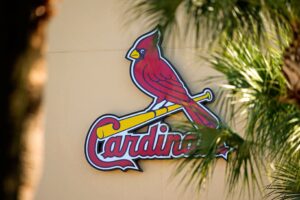It was just another chapter in the colorful history of gambling, legal and illegal, in Pittsburgh. By now you know that San Diego Padres infielder Tucupita Marcano has received a lifetime ban from Major League Baseball. His crime was betting on baseball games while a member of the Pittsburgh Pirates. These bets included games in which the Pirates participated. If it had to happen, Pittsburgh was the place.
Marcano Adds Chapter to Pittsburgh Gambling History
The level of stupidity is astounding for a 24-year-old with the potential for a long major league career ahead. The Associated Press photo that accompanied the story, depicting Marcano holding a sword at neck level in the Pirates’ dugout, was an apt metaphor. He had cut his own throat. Marcano would likely be nothing more than a utility player, but even at that, a good living can be made. To add insult to injury, he lost all 25 bets he placed on the Pirates games and 96 percent of the bets he placed on other games.
MLB announces Tucupita Marcano has been banned from baseball
He bet on 25 Pittsburgh Pirates games while he was assigned to the team, but he was injured during all of them and lost all those bets
He gambled more than $150K on baseball and won just 4.3 percent of his MLB bets pic.twitter.com/Gkn2HFVRWb
— Talkin’ Baseball (@TalkinBaseball_) June 4, 2024
It May Not Have Happened in the Good Old Days of Pittsburgh Gambling
At one time, illegal bookies ran amok in Pittsburgh. Some remain today, but most have been put out of business by the Pennsylvania Daily Lottery, the Three Rivers Casino, and betting websites. They used to operate in the working-class sections of Pittsburgh. When one heard somebody was a “numbers writer,” it didn’t mean he was an accountant. At one time, seemingly everybody in Pittsburgh except the numbers writers was “playing the numbers.”
Anybody could bet on a random three-digit number “hitting.” Before the days of legal state lottery drawings, the “number” might be the last digits of the win, place, and show at a local horse-racing tracking. Or it might be the last digit of the number of shares advanced, declined, and unchanged on the New York Stock Exchange. In 1936, Rev. William R. Pankey of Pittsburgh’s Union Baptist Church complained to his congregation that the numbers of the hymns sung on Sunday were bet on Monday. Everybody, except, of course, the bookies, were betting on something.
However, many of these bookies lived in neighborhoods and knew their neighbors. If a neighbor was betting over his head, the bookie might talk him out of it, or refuse to take the bet altogether. Surely, they wouldn’t allow somebody to jeopardize his livelihood with a bet like Marcano did. Today, one simply logs on to a faceless, soulless betting app that doesn’t care whether one loses all his money or his career. Maybe Marcano needed an illegal bookie. Not the kind that allowed Ippei Mizuhara, Shohei Ohtani’s interpreter, to lose some $16 million that he didn’t have. Rather, he would have been better off with a small-time bookie once found in Pittsburgh’s neighborhoods.
Pittsburgh Bookmaker Founded the Negro National League
Gus Greenlee was one of the more famous Pittsburgh bookies. Greenlee was a black businessman residing in the predominantly black Hill District. He owned nightclubs and restaurants and was also a boxing promoter. In 1931, he bought the Pittsburgh Crawfords. Two years later, he founded the Negro National Leagues. Despite his successes, a bank wasn’t going to give a black man from “the Hill” a bank loan to start a new baseball league. Thus, he began a numbers racket of his own to finance his new team and the upstart league. The Pittsburgh Crawfords became one of the best teams in the history of baseball, thanks to money Greenlee poured in from his gambling activities. The Crawfords included future Hall-of-Famers Cool Papa Bell, Oscar Charleston, Josh Gibson, and Satchel Paige. Greenlee was also known for his philanthropy toward the members of Pittsburgh’s black community.
Greenlee never faced criminal charges for numbers-running. This was usually not a concern for any numbers writers. Police had other things to do or simply looked the other way. In 2018, the Pittsburgh Post-Gazette interviewed a bookie who expected to continue to thrive despite the new casino. The anonymous bookie said that two of his customers were policemen. One was to warn him of any gambling investigations ahead of time.
On a side note, similar to Greenlee, Pittsburgh Steelers owner Art Rooney ran gambling and bootlegging operations, but was never charged, despite being named in the FBI’s annual crime surveys. (Rooney always denied it. Recently, his family has been more forthcoming about it.) That makes two Pittsburgh professional sports teams that wouldn’t have existed without gambling.
Gambling at Forbes Field in Pittsburgh
The history of Pittsburgh is rich with tales of gambling at Forbes Field. Bookies worked the aisles taking bets on the outcome of the game. It got to be such a nuisance that in 1942, George E.A. Fairley, Director of the Department of Public Safety, promised Pirates president William E. Benswanger that the Pittsburgh Police would patrol the stands and rid them of gamblers, just as soon as Benswanger gave the OK. It had very little effect. The betting continued. In 1948, The Pittsburgh Press observed a policeman placing a bet in the stands.
The Lottery Fix
Tony Grosso ran the numbers racket in Pittsburgh for many years beginning in the late 1940s. Most city denizens were in favor of Grosso, or at least were indifferent. His operation employed 5,000 people at its peak. His organization never threatened or did bodily harm to anybody, and it kept more ruthless mobsters out. Oh – and he also uncovered the biggest scam in the gambling history of Pittsburgh.
The date was April 24, 1980. The Pennsylvania Daily Lottery drawing took place at 7:00 PM as usual. The three numbers were chosen from an air machine that propelled numbered ping-pong balls to an opening at the top of the machine. The first three numbers drawn, in order, were the lottery numbers for the day. The drawing was held at WTAE-TV studios, hosted by broadcasting veteran Nick Perry. Perry was best known as the host of Bowling For Dollars, where his masterfully charming interviews relaxed the contestants before their brief moment of bowling fame.
On this day, number 666 was the winning number. The payout was a record $3.5 million. All on the level, right? Wrong! Apparently, a large number of bets on various combinations of six and nine were placed illegally, too. The bookies cried fix and wouldn’t pay off. The loudest voice, and the only one who spoke on the record, was Grosso. He insisted he retired upon his release from prison after a 1973 conviction and heard about the fix from “associates.” Pennsylvania officials scoffed. They thought Grosso was merely trying to discredit the lottery because it was putting the underground out of business.
Weighted Ping-Pong Balls
The Pennsylvania officials were soon eating their words. Subsequent investigations revealed that all balls numbered six or nine were weighed down with a liquid. Perry, who maintained his innocence till his passing, was one of many convicted for fixing the lottery. Meanwhile, Governor Dick Thornburg was criticized for not knowing as much about his lottery as Grosso. In 1986, Grosso was convicted of tax evasion and returned to prison. He was disappointed that Thornburg never intervened on his behalf.
The Last Word
Marcano now joins Greenlee, Rooney, Grosso, and Perry in the storied history of Pittsburgh gambling. That history includes illegal bookmakers who started professional sports teams and a league, were philanthropists, and uncovered a major scam. Pittsburgh was a better place when the bookies reigned supreme. When was the last time a betting site did something for your community?
Photo Credit: © Charles LeClaire-USA TODAY Sports






